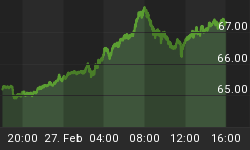June 5, 2008
As expected, the European Central Bank (ECB) left its refi rate at 4.0% again this morning. What was not expected was the hawkish tone of the subsequent statement and the press briefing from President Trichet. He noted that the Governing Council had a "deep discussion" (trans: "fierce debate"?) and remains "in a state of heightened alertness." Some members apparently wanted a rate hike this month but the consensus was to hold. The President then noted that the Council may decide to make "a small hike" at the July 3 meeting in order to anchor inflation expectations. The statement emphasized that risks to prices remain clearly on the upside and have increased further. And, Trichet reiterated that the bank's mandate is to ensure medium-term price stability, which means firmly anchoring inflation expectations. The euro promptly firmed anew.
Today's policy meeting took place against the backdrop of the ECB's ten year anniversary. Back on June 1, 1998, annual inflation in the eleven countries joining the Euro-zone was running at just 1.4%, a barrel of Brent crude cost $15.60, and 3-month Euribor stood at 3.575%. While the 2000-2001 period brought a spike in inflation and market rates, the rest of the decade was fairly predictable policy-wise as price increases moved pretty much hand-in-hand with growth.
Chart 1
Today's ECB faces a much more challenging world. Inflation is rising, the interbank market is still struggling, and the macroeconomic impacts of the US slowdown and global financial turmoil are now coming home to roost. Inflation in the 15-member 'zone climbed to 3.6% in May, Brent crude stands at $128pb, and 3-month Euribor today hit 4.864%, the highest so far this year. On the plus side, today's ECB policy-making has clarity, coherence, and credibility, all of which were sorely lacking a decade ago.
The ECB and its President apparently have decided that their best course is to stick firmly to the bank's mandate of maintaining price stability. Trichet himself set the tone at a speech this past weekend, when he warned that bad management of the oil crisis back in the 1970s (large wage rises and low interest rates) seriously hurt the economy. He concluded by warning that the errors of the past must not be repeated.
As noted, Euro-zone headline inflation jumped to 3.6% in May. The pace of M3 money supply growth (something the Council is known to watch closely), which appeared to be on a downward trend in recent months, nudged back up to 10.6% in April from 10.1% in March. As Trichet pointed out today, while this probably overstates the underlying pace of monetary expansion thanks to financial market upheavals, the underlying rate of money and credit growth remains strong.
Chart 2
Add in better-than-expected GDP growth in Q1 - up 0.8% on the quarter and 2.2% on the year - and the case for a July rate hike looks clear. Except, of course, that forward-looking data point to much slower growth for the 'zone as a whole in Q2, while the outlook for some countries is downright gloomy.
Retail sales across the 15 'zone countries fell 0.6% m-o-m and 2.9% y-o-y in April (-0.9% and -2.3%, respectively, in March) as increasingly-expensive oil and food hit consumers' purchasing power. The European Commission's economic sentiment survey for May showed consumer confidence hit its lowest level since September 2005 although overall sentiment did at least stabilize and inflation expectations continue to hover around the same level as last summer.
Chart 3
Euro-zone services PMI slipped closer to contraction in May, coming in at 50.6 from 52.0 in April, and took a particularly sharp hit in France, while Italy saw services PMI contract for the third straight month and Spain for the fifth. Industrial new orders for the Euro-zone were much weaker than expected in March, shrinking 1.0% on the month and 2.5% on the year. And, today came the news that manufacturing orders in powerhouse Germany slipped 1.8% on the month in April as capital goods orders from other Euro-zone states dropped 9.0% - a reflection perhaps of rapid cooling in the likes of Spain and Ireland.
So, what are the odds of a July rate hike? The ECB's mandate is to keep inflation "below but close to 2%" in the medium term. That qualifier allows some wriggle-room - the Council can say that current conditions are temporary and prices will come back toward target in the "medium-term" and can define that however it sees fit. For now, our hunch is that the Council will continue to talk tough but the consensus to stand pat will prevail. As always, though, watch the data.















